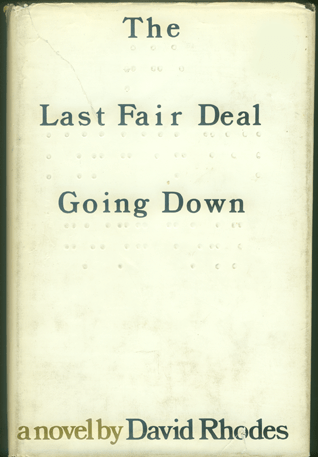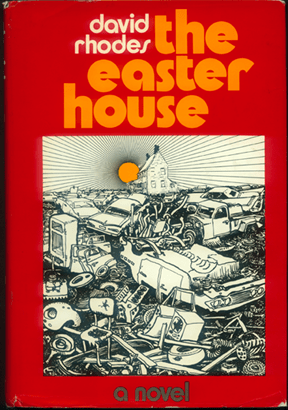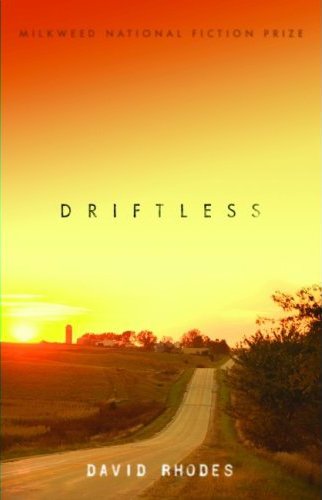A bibliography of David Rhodes, the author of four novels, including Driftless, published this month by Milkweed Editions.

David Rhodes's debut novel was published by Atlantic, Little-Brown in 1972, when he was just twenty-six years old. It is the tale of two cities: Des Moines, home to the Sledge family, a seedy lot of characters fathered by a railroader who drinks himself to death on a dare; and a metaphorical "City" built by religious fanatics at the bottom of a gigantic hole in the ground and teeming with cannibalistic heroin addicts too paralyzed by religious guilt to escape.
Rhodes used an early draft of a portion of the novel as his writing sample when he applied for admission to the Iowa Writers' Workshop. He was accepted into the program, where he completed the manuscript, which was bought by Atlantic, Little-Brown before he even graduated.

Rhodes began writing his second novel, The Easter House (Harper & Row, 1974), in Iowa City, where he lived for another year following his graduation from the Writers' Workshop in 1971. "The Easter House actually came quicker than anything I’ve ever done," Rhodes says. "It was just there, and I wrote it down and I didn’t have to make many changes. It was just kind of a story into itself."
The novel revolves around the Easter family (Ansel, who suffers a violent death; and his sons, C and Sam, who administer to the family junkyard and found "the Associate," an ad-hoc group of men who hire themselves out to do odd and sometimes criminal jobs) and the Wood family, particularly Fisher Wood, the son of the local banker who has also been the Easters' secret patron following Ansel's death.
Alan Cheuse, in a review published in the New York Times on August 4, 1974, compared the appearance of The Easter House to the publication of Sherwood Anderson's classic Winesburg, Ohio.

David Rhodes's third novel, originally published by Harper & Row in 1975, is the story of July Montgomery, a boy who runs away from his hometown of Sharon Springs, Iowa, to Philadelphia, only to return years later with hopes of recapturing all that he lost.
In his seminal book On Becoming a Novelist (Harper & Row, 1983), John Gardner held Rock Island Line up as proof that Rhodes has "one of the best eyes in recent fiction." Milkweed Editions is publishing a new edition of the novel, along with Driftless, in September.

Populated by an entire community of characters—the humble dairy farmers Cora and Graham Shotwell who rally against mysterious corporate forces; Violet Brasso and her sister, Olivia, a paraplegic who suddenly regains the use of her legs; Rusty Smith, a hard-working retiree who confronts his prejudices about the Amish; and Winifred Smith, a pastor at the local church who finds enlightenment where she least expects it—Driftless explores the uncommon connections that are forged, often unwittingly, between private people. Running throughout the novel is the story of July Montgomery, the main character of Rock Island Line, a vagabond who arrives in the small town of Words, Wisconsin, either to find a home where he can feel a part of other people’s lives, or die trying.
Publishers Weekly recently called the novel "expansive and affecting," proof that Rhodes "still knows how to keep readers riveted."






